Published 23 September 2022 ● Last Updated on 10 October 2022
Food… the source of energy, nutrients, and life itself!
Almost all ancient civilisations and cultures of the world agree that food eaten right is all the medicine you need. In China, as far back as 2200 BCE, ancient clans started to discover the different medical values of herbs while they were still hunting and gathering. Indian traditional medicine Ayurveda advocates foods having therapeutic and medicinal value. In Tamil culture, Unnave Marundhu (food is medicine) was practised since the early Sangam era (6th century BCE). Even the father of modern medicine, the Greek physician Hippocrates said, “Leave your drugs in the chemist’s pot if you can heal your patient with food.”
I am a firm believer in the adage you are what you eat! Though this was not me until I had my son. After a difficult pregnancy and postpartum concerns, when it was time for the little fellow to start solids, I realised that I could play a stronger role in giving him a life of health. This was the advent of a new me, I began taking food much more seriously. I read up extensively about ingredients – how they work in the body and what benefits we can derive from them. I soon understood that our pantry is a treasure chest with magic potions of health. I am sharing below a few ingredients that my family has benefitted from.
1. Turmeric or Haldi
Turmeric, I would say, is the queen of the kitchen as it may be the most effective health booster in existence. Many studies show that turmeric has major benefits for your body and brain; these benefits come from its main active ingredient, curcumin, which has powerful anti-inflammatory properties and is a very strong antioxidant.
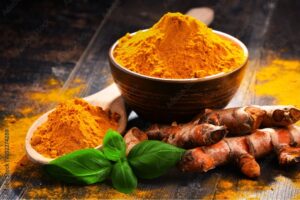
Being Indian, my everyday food has copious amounts of this yellow gold. In addition, our family ingests a concoction of turmeric and pepper powders mixed with virgin coconut oil or honey on an empty stomach. This mixture works wonders as an immunity booster, and I am witness to this magic!
Why pepper and oil you may ask? The body better absorbs curcumin with the aid of Piperine in the pepper; and since turmeric is fat soluble, it absorbs more efficiently when combined with a healthy fat such as coconut oil.
2. Carom or Ajwain
Carom seeds, although referred to as seeds, are the fruit of the herb popularly called ajwain in India. They’re slightly green to brown in colour and have a pungent, bitter taste. They look like cumin seeds, but their taste and aroma are closer to that of thyme.
Carom seeds have powerful antibacterial and antifungal properties. This is attributed to two of its active compounds, thymol and carvacrol, which are known to inhibit the growth of bacteria and fungi. The seeds are used to relieve digestive issues and prevent coughs.
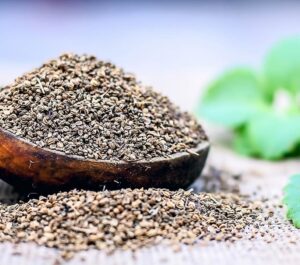
Owing to its pungent smell and taste, carom is not used in everyday cooking, however, when making anything that could be heavy on the stomach, most Indian households add a pinch of the seeds, crushed by rubbing it in between the palms.
Carom seeds tea is a great way of including this herb in your diet. You can crush the herb like I have explained above and put it in a glass of water and allow it to boil and then consume it. This tea is especially helpful when you have stomach aches or cramps.
3. Indian Gooseberry or Amla
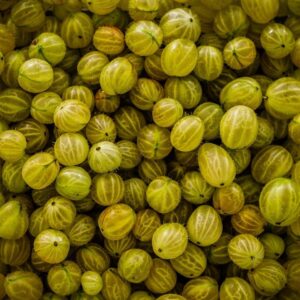
While we can’t be entirely sure when Ayurvedic healers started using amla, historical records tell us that they have been used in remedies for at least 1,000 years. A 100-gram serving of fresh amla contains as much vitamin C as 20 oranges. Amla is also rich in antioxidants, which reduce the risk of chronic health conditions like heart disease, diabetes, and cancer. It is also an excellent source of Vitamin E, Vitamin A, Iron and Calcium. Fresh amla is also high in fibre and low in sugar.
When amla is in season, we make pickles at home and savour it. But for many, the tart taste of gooseberries can be difficult to handle. Here are a few methods to include this nutrition powerhouse in your meal
– Pickle it in brine
– Make a chutney
– Juice it: You can mash the fruit and soak it in water overnight; drain the pulp and seeds; drink the remaining juice.
– Make a sweet jam or murabba
If you are looking for a fuss-free way to add gooseberry to your diet – there’s Chayvanaprash – a popular dietary supplement with several ingredients besides amla (easily available in India as well as Indian stores worldwide). Amla powder is also easily available – choose a brand that you trust; you can then brew amla tea just like carom tea.
4. Raisins or Kishmish
The drying process of grapes to make raisins concentrates both the nutrients and sugars making them nutrient dense. Raisins are high in iron, potassium, copper, vitamin B6 and manganese. They also contain boron which helps maintain good bone and joint health.
As we know it today, gut health is paramount for a healthy life. Raisins are highly alkaline in nature and help to maintain the PH balance in the stomach. The high fibre in raisins also makes it an ideal food for constipation.
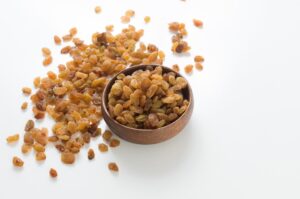
In order to alleviate constipation, soak some raisins in water overnight and drink the water and eat the raisins the next morning on an empty stomach. If you have pure saffron you can add a few strands to the water before soaking the raisins, the antioxidant properties of saffron enhance the health benefits of this potion. Raisins happen to be my son’s favourite dry fruit and he loves it when I make this potion at home.
5. Fennel seeds or Saunf
In many parts of the world, fennel seeds are used medicinally to treat everything from menstrual cramps to abdominal gas. In India, fennel is often used as a mouth freshener as it contains a specific aromatic essential oil that possesses antibacterial properties that help to freshen your breath. Sweet fennel seeds increase the secretion of saliva, which helps to kill harmful bacteria. It is a simple and effective home remedy to combat bad breath.
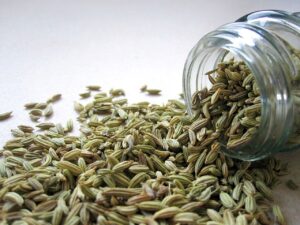
Munching on fennel seeds can freshen your breath while adding fibre to your body. The essential oils stimulate the secretion of digestive juices and enzymes that improves digestion. Anethole, fenchone and estragole in fennel act as antispasmodic and anti-inflammatory and work wonderfully for constipation, indigestion, and bloating.
Apart from chewing fennel, you can use it as an ingredient alongside other spices when making curries. Fennel tea is another excellent way to consume these seeds.
The Proof is in the Pudding!
These are but a handful of ingredients that have helped me personally in ensuring we are a healthy family. Our kitchen has many more potent items that can help us lead a healthy life. The cue is to use these ingredients in moderation and up our health by being conscious of what we eat, how well we sleep and how much we move.
Food is slowly moving away from being simple, soul-satisfying and gut-healthy to fancy and fast! Our health is in our hands, the need of the hour is to slow down and watch what we eat.
Related Links
Natural Remedies | 5 healing plants to begin your herb garden
Eco Home | Innovative ways to put those “waste” fruit peels to use



0 Comments